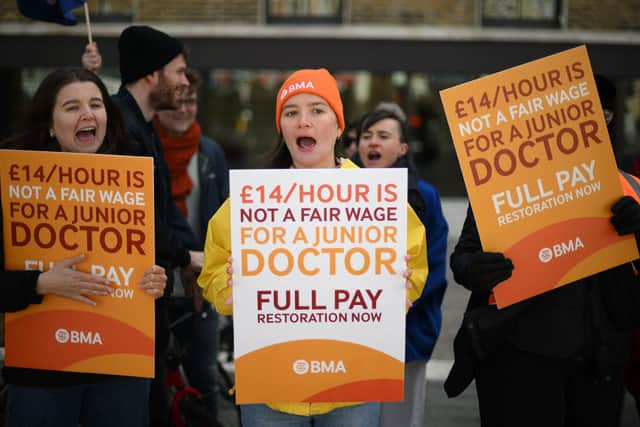NHS bracing for ‘enormous’ disruption next week as junior doctors to stage 72 hour strike over pay
and live on Freeview channel 276
The NHS will face “enormous” disruption next week as junior doctors in England stage a 72 hours strike over pay, a top doctor has warned.
Professor Stephen Powis, NHS England’s national medical director, warned that almost all routine or pre-planned care could be impacted in some way by the walkout.
Advertisement
Hide AdAdvertisement
Hide AdJunior doctors are set to strike from 7am on Wednesday 14 June until 7am on Saturday 17 June in the ongoing dispute over pay, which will see senior doctors and nurses be drafted in to cover urgent and emergency care, while other work will be postponed.


Prof Powis said thousands of routine procedures had already been rescheduled but urged people still to attend unless they had been contacted. A similar walkout by junior doctors in April saw 196,000 hospital appointments and pre-planned operations rescheduled.
He said: “The NHS has been preparing extensively for this next set of strikes, but we know that – with the sheer number of appointments that need to be rescheduled – it will have an enormous impact on routine care for patients and on the waiting list, as procedures can take time to rearrange with multiple teams involved.
“As we enter the seventh month of industrial action across the NHS, and as this action becomes more frequent, we are now seeing an extraordinary cumulative impact on our services and crucially on our staff, who continue to go above and beyond to maintain safe patient services during this challenging period.
Advertisement
Hide AdAdvertisement
Hide Ad“Emergency, urgent and critical care will be prioritised this week, but some patients will unfortunately have had their appointments postponed – if you haven’t been contacted to reschedule, please do continue to attend your planned appointment. This week, as ever, use 999 and A&E for life-threatening emergencies, using NHS 111 online for all other health conditions.”
The strike was announced after talks between the British Medical Association (BMA) and the government broke down in May. Last week Health Secretary Steve Barclay said there needs to be “movement on both sides” amid the dispute, and insisted the government’s door remains open. But he went on to accuse the BMA’s Junior Doctors Committee of refusing to budge from its 35% pay demand, despite bringing an intermediary to negotiations.
A Department of Health and Social Care spokesperson said: “Another three days of strikes by junior doctors will risk patient safety and lead to further disruption and postponed treatments. We made a fair and reasonable opening offer to the BMA and were in active discussions about both pay and non-pay issues.
“Unfortunately, it seems they are unwilling to move meaningfully away from unreasonable demands that would see doctors’ pay increase by either 35% this year, or at least 49% by next year, which were the two propositions they put on the table.
Advertisement
Hide AdAdvertisement
Hide Ad“We are working with NHS England to put in place contingency plans to protect patient safety. The NHS will prioritise resources to protect emergency treatment, critical care, neonatal care and trauma.”
Meanwhile, senior health leaders have also implored the government and junior doctors to reopen negotiations ahead of the strike. Matthew Taylor, chief executive of the NHS Confederation, which represents NHS trusts, said: “It’s disappointing that the NHS is having to brace itself for a further round of industrial action once again as the government and junior doctors have not found common ground on the pay dispute. Both sides will need to cede some ground if there is to be any hope of a resolution, and the NHS really needs to see one soon.
“Leaders have prepared well again ahead of the strike and are doing all they can to prioritise patient safety, which will mean that some elective activity and outpatient appointments will take a hit in favour of life and limb care.
“This delay to elective care is what concerns leaders most, and has a real impact on patients, many of whom will have already been waiting a long time only to see their operation cancelled.
Advertisement
Hide AdAdvertisement
Hide Ad“The impact of this can be significant, with patients potentially developing complications or their condition worsening as a result. It also means that the waiting list, currently at 7.4 million, is likely to grow further and take longer to clear.”
The warning comes as the health service raised concerns about the impact of warm weather on urgent and emergency care, with NHS England calling for people to do their best to protect themselves in the heat as many parts of the country are facing high demand for urgent care services.
It urged people, particularly the elderly, to follow warm weather guidance including keeping their homes cool by keeping windows and curtains closed in the day and opening them at night when the temperature has gone down, and checking the temperature of their rooms.
Comment Guidelines
National World encourages reader discussion on our stories. User feedback, insights and back-and-forth exchanges add a rich layer of context to reporting. Please review our Community Guidelines before commenting.
